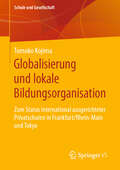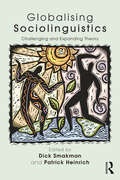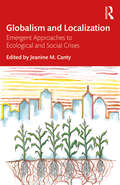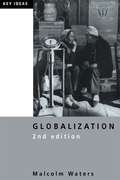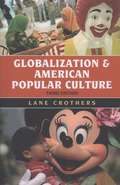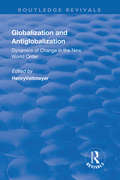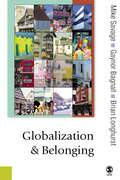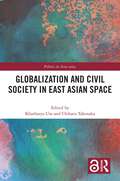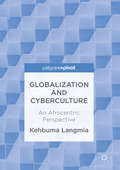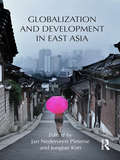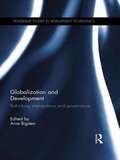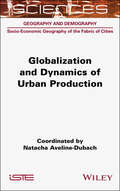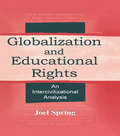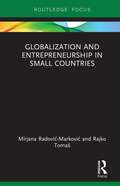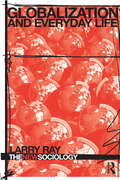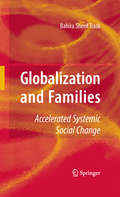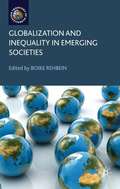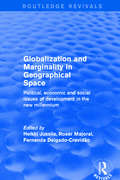- Table View
- List View
Globalisierung und lokale Bildungsorganisation: Zum Status international ausgerichteter Privatschulen in Frankfurt/Rhein-Main und Tokyo (Schule und Gesellschaft #71)
by Tomoko KojimaDie qualitative Vergleichsstudie beschäftigt sich mit der Frage, wie sich die lokale Bildungsorganisation gegenwärtig hinsichtlich der Globalisierung und der Präsenz der Privatschulen mit internationalem Profil verändert. Betrachtet werden exemplarische Fälle in zwei global cities, Frankfurt/Rhein-Main und Tokyo. Dabei werden unterschiedliche Formen international ausgerichteter Privatschulen sowie ihre Differenzierung von bzw. Identifikation mit dem lokalen Bildungskontext aufgezeigt. Die damit einhergehende Überschreitung von Grenzen im nationalstaatlichen Erziehungssystem und deren Folgen werden semantisch aus der Governance-Perspektive sowie aus systemtheoretischer Sicht regional kontrastierend diskutiert.
Globalising Sociolinguistics: Challenging and Expanding Theory
by Dick Smakman Patrick HeinrichThis book challenges the predominance of mainstream sociolinguistic theories by focusing on lesser known sociolinguistic systems, from regions of Africa, Asia, the Caribbean, South America, the European Mediterranean, and Slavic regions as well as specific speech communities such as those speaking Nivkh, Jamaican Creole, North Saami, and Central Yup’ik. In nineteen chapters, the specialist authors look at key sociolinguistic aspects of each region or speech community, such as gender, politeness strategies, speech patterns and the effects of social hierarchy on language, concentrating on the differences from mainstream models. The volume, introduced by Miriam Meyerhoff, has been written by the leading expert of each specific region or community and includes contributions by Rajend Mesthrie, Marc Greenberg and Daming Xu. This publication draws together connections across regions/communities and considers how mainstream sociolinguistics is incomplete or lacking. It reveals how lesser-known cultures can play an important role in the building of theory in sociolinguistics. Globalising Sociolinguistics is essential reading for any researcher in sociolinguistics and language variation and will be a key reference for advanced sociolinguistics courses.
Globalism and Localization: Emergent Solutions to Ecological and Social Crises
by Jeanine M. CantyConsidering the context of the present ecological and social crisis, this book takes an interdisciplinary approach to explore the relationship between globalism and localization. Globalism may be viewed as a positive emergent property of globalization. The latter depicts a worldwide economic and political system, and arguably a worldview, that has directly increased planetary levels of injustice, poverty, militarism, violence, and ecological destruction. In contrast, globalism represents interconnected systems of exchange and resourcefulness through increased communications across innumerable global diversities. In an economic, cultural, and political framework, localization centers on small-scale communities placed within the immediate bioregion, providing intimacy between the means of production and consumption, as well as long-term security and resilience. There is an increasing movement towards localization in order to counteract the destruction wreaked by globalization, yet our world is deeply and integrally immersed within a globalized reality. Within this collection, contributors expound upon the connection between local and global phenomenon within their respective fields including social ecology, climate justice, ecopsychology, big history, peace ecology, social justice, community resilience, indigenous rights, permaculture, food justice, liberatory politics, and both transformative and transpersonal studies.
Globalization (Key Ideas)
by Malcolm WatersThe constraints of geography are shrinking and the world is becoming a single place. Globalization and the global society are increasingly occupying the centre of sociological debates. Widely discussed by journalists and a key goal for many businesses, globalization has become a buzz-word in recent years. In this extensively revised and restructured new edition of Globalization , Malcolm Waters provides a user-friendly introduction to the main arguments about the process, including a chapter on the critiques of the globalization thesis that have emerged since the first edition was published.
Globalization East and West: Perspectives From The Gulf (Encounters: An International Journal For The Study Of Culture And Society Ser. #Vol. 8)
by Bryan S. Turner Habibul H. KhondkerDo we confuse globalization for Americanization? What are the distinctive elements in the interplay of the local and the global?<P><P> This much needed book is the first full length text to examine globalization from the perspective of both the West and the East. It considers globalization as a general social and economic process, and the challenges it presents for Western social science. <P> The meaning of a global perspective is explored through various concrete examples: religion, migration, medicine, terrorism, global disasters, citizenship, multiculturalism, media and popular culture. <P> Introduced with a forword from Roland Robertson, the book is brimming with novel interpretations and fresh insights that will contribute to illuminating the practical realities of globalization.
Globalization and American Popular Culture (Globalization)
by Lane CrothersNow in a fully revised and updated edition, this concise and insightful book explores the ways American popular products such as movies, music, television programs, fast food, sports, and even clothing styles have molded and continue to influence modern globalization. Lane Crothers offers a nuanced examination of both the appeal of American products worldwide and the fear and rejection they induce in many people and nations around the world. The author defines what we mean by "popular culture," how popular culture is distinguished from the generic concept of "culture," and what constitutes "American" popular culture. Tracing how U.S. movies, music, and TV became dominant in world popular culture, Crothers also considers the ways in which non-visual products like fast-food franchises, sports, and fashion have become ubiquitous. Concluding with a projection of the future impact of American popular culture, this book makes a powerful argument for its central role in shaping global politics and economic development.
Globalization and Antiglobalization: Dynamics of Change in the New World Order (The\international Political Economy Of New Regionalisms Ser.)
by Jonathan RutherfordThis title was first published in 2003. Globalisation can be seen to provide the context for epoch-defining changes in social and economic forms of organisation. However, it has also changed the context for and the organisational forms of politics, unleashing forces in support of, and in opposition to, the globalisation dynamic. This text examines the dynamics of change and development in two regions of the world economy, Latin America and Asia, and is a series of explorations into the forces, their political dynamics, and the responses of governments and citizens. The focus of the explorations, and regional case studies, is on the role of the nation-state, international organisations and social movements.
Globalization and Belonging (Published in association with Theory, Culture & Society)
by Mike Savage Gaynor Bagnall Brian Longhurst'Globalization and Belonging's headline message - that place matters, that locality remains vital to people, is arresting' - Frank Webster, Professor of Sociology, City University, London Drawing on long-term empirical research into cultural practices, lifestyles and identities, Globalization and Belonging explores how far-reaching global changes are articulated locally. The authors address key sociological issues of stratification as analysis alongside 'cultural' issues of identity, difference, choice and lifestyle. Their original argument: " Shows how globalisation theory conceives of the 'local' " Reveals that people have a sense of elective belonging based on where they choose to put down roots " Suggests that the feel of a place is much more strongly influenced by the values and lifestyles of those migrating to it " reinvigorates debates in urban and community studies by recovering the 'local' as an intrinsic aspect of globalisation Theoretically rigorous, the book is brought to life with direct quotations from the authors' research, and appeals to students in urban sociology, urban geography, media studies and cultural studies.
Globalization and Civil Society in East Asian Space (Politics in Asia)
by Khatharya Um Chiharu TakenakaThis book critically examines the impact of globalization, changing power dynamics, migration, and evolving rights regimes on regional order, discourse of national governance, state and society relations, and the development of civil society in East Asia. Providing a textured, critical reading of East Asia as an economically, socially, and politically dynamic region, this book also presents the region as one shaped simultaneously by progressive as well as regressive pulls. Attentive to prevailing issues as well as to states’ and civil societies’ responses to them, it focuses on changing societies and politics in East Asia, particularly on shifting notions of citizenship, nationhood, and peoplehood. The contributions feature new and timely conclusions drawn from multidisciplinary fields including law, public policy, sociology, Asian studies, gender, sexuality, and ethnic studies and include direct testimonies from citizens of East and Southeast Asia. Globalization and Civil Society in East Asian Space will appeal to students and scholars of sociology, political science, and Asian studies more broadly.
Globalization and Civil Society in East Asian Space (Politics in Asia)
by Khatharya Um Chiharu TakenakaThis book critically examines the impact of globalization, changing power dynamics, migration, and evolving rights regimes on regional order, discourse of national governance, state and society relations, and the development of civil society in East Asia.Providing a textured, critical reading of East Asia as an economically, socially, and politically dynamic region, this book also presents the region as one shaped simultaneously by progressive as well as regressive pulls. Attentive to prevailing issues as well as to states’ and civil societies’ responses to them, it focuses on changing societies and politics in East Asia, particularly on shifting notions of citizenship, nationhood, and peoplehood. The contributions feature new and timely conclusions drawn from multidisciplinary fields including law, public policy, sociology, Asian studies, gender, sexuality, and ethnic studies and include direct testimonies from citizens of East and Southeast Asia.Globalization and Civil Society in East Asian Space will appeal to students and scholars of sociology, political science, and Asian studies more broadly.
Globalization and Culture: Global Melange
by Jan Nederveen PieterseIs there cultural life after globalization? Jan Nederveen Pieterse argues that what is taking place today is a global melange, a culture of hybridization.
Globalization and Cyberculture
by Kehbuma LangmiaThis book argues for hybridity of Western and African cultures within cybercultural and subcultural forms of communication. Kehbuma Langmia argues that when both Western and African cultures merge together through new forms of digital communication, marginalized populations in Africa are able to embrace communication, which could help in the socio-cultural and political development of the continent. On the other hand, the book also engages Richard McPhail's Electronic Colonization Theory in order to demonstrate how developing areas such as Africa experience a new form of imperialistic subjugation because of electronic and digital communication. Globalization and Cyberculture illustrates how new forms of communication inculcate age-old traditional forms of communications into Africa's cyberculture while complicating notions of identity, dependency, and the digital divide gap.
Globalization and Development in East Asia (Routledge Studies in Emerging Societies #2)
by Jan Nederveen Pieterse Jongtae KimEast Asia is widely regarded as the main "winner" in contemporary globalization, unscathed by the economic crisis of 2008, with its leading new industrializing nations and emerging economies. While 20th-century globalization was mainly led by the West, the 21st century is ushering in different dynamics. The re-emergence of Asia involves alternative visions of the world and different perspectives on globalization. This volume seeks to address these dimensions, turning to local reflexivities, notably in South Korea and China, to explore the key debates in sociology and political economy within East Asia rather than from an outside view.
Globalization and Development: Rethinking Interventions and Governance (Routledge Studies in Development Economics #102)
by Arne BigstenThe key challenge for achieving sustained development in developing countries relates to quality of domestic governance, which in turn is strongly affected by external interventions. Domestic governance includes politics, policy formulation, institution building and policy implementation. It is important for both international and domestic agents to understand how the interplay between external interventions and domestic governance affects social and economic outcomes. This volume presents a series of studies analysing the links between external interventions and domestic governance in the areas of economic, social and security policy. Key questions that are addressed here include: How do external interventions in economic, social and security areas affect domestic governance in developing countries? Is aid more effective in decentralised systems of government? What are the interactions between external interventions and domestic governance? How can external agents advance domestic governance? Due to its strong focus on external interventions and domestic governance, this book will be of interest to scholars of development studies across the social sciences, in addition to the fields of economics, political science, sociology and geography.
Globalization and Diversity: Geography of a Changing World (Second Edition)
by Lester Rowntree Martin Lewis Marie Price William WyckoffGlobalization and Diversity is an exciting contemporary approach to World Regional Geography that explicitly acknowledges the geographic changes that accompany today's rapid rate of globalization. Organizes each regional chapter into five thematic sections: Environmental Geography; Population and Settlement; Cultural Coherence and Diversity; Geopolitical Framework; Economic and Social Development.
Globalization and Dynamics of Urban Production
by Natacha Aveline-DubachOver the last 20 years, urbanization processes have undergone profound transformations under the growing influence of private actors, particularly in the financial sector. This has exposed the physical environment of various cities to global capital flows, which has generated an overall rise in real estate values on a global scale. This is often disconnected from the financial capacities of local actors – primarily households – which then increases the inequalities and vulnerabilities of societies regarding financial and environmental risks. This book offers the keys to understanding these new dynamics of capital accumulation in the general built-up environment of cities by taking into account the diversity of their configurations, their intensity and their urban effects according to national contexts. Beyond the cases involving the major Western countries, the initial centers of the financial industry and the theorizations on the urban, this book addresses the particular contexts of real estate production in four major regions: Northeast Asia, Southeast Asia, the Middle East and West Africa.
Globalization and Educational Rights: An Intercivilizational Analysis (Sociocultural, Political, and Historical Studies in Education)
by Joel SpringThis is the first book to explore the meaning of equality and freedom of education in a global context and their relationship to the universal right to education. It also proposes evaluating school systems according to their achievement of equality and freedom. Education in the 21st century is widely viewed as a necessary condition for the promotion of human welfare, and thus identified as a basic human right. Educational rights are included in many national constitutions written since the global spread of human rights ideas after World War II. But as a global idea, the meaning of educational rights varies between civilizations. In this book, which builds on the concept of the universal right to education set forth in Spring's The Universal Right to Education: Justification, Definition, and Guidelines, his intercivilizational analysis of educational rights focuses on four of the world's major civilizations: Confucian, Islamic, Western, and Hindu. Spring begins by considering educational rights as part of the global flow of ideas and the global culture of schooling. He also considers the tension this generates within different civilizational traditions. Next, he proceeds to: *examine the meaning of educational rights in the Confucian tradition, in the recent history of China, and in the Chinese Constitution; *look at educational rights in the context of Islamic civilization and as presented in the constitutions of Islamic countries, including an analysis of the sharp contrast between the religious orientation of Islamic educational rights and those of China and the West; *explore the problems created by the Western natural rights tradition and the eventual acceptance of educational rights as represented in European constitutions, with a focus on the development and prominence given in the West to the relationship between schooling and equality of opportunity; and, *investigate the effect of global culture on India and the blend of Western and Hindu ideas in the Indian constitution, highlighting the obstacles to fulfillment of educational rights created by centuries of discrimination against women and lower castes. In his conclusion, Spring presents an educational rights statement based on his intercivilizational analysis and his examination of national constitutions. This statement is intended to serve as a model for the inclusion of educational rights in national constitutions.
Globalization and Entrepreneurship in Small Countries (Routledge Focus on Business and Management)
by Mirjana Radović-Marković Rajko TomašThe changeable business environment requires a new business framework and an understanding of the global market trends and the culture that will impact on business. Globalization and Entrepreneurship in Small Countries considers important business principles and makes them accessible for entrepreneurs and small business owners. It addresses the role of managers and leaders and management techniques in the context of global strategy of companies, as well as the culture diversity that comes with globalization of organizations. To meet the constantly changing conditions and demands, business must transcend boundaries to get what it needs regardless of where it exists – geographically, organizationally, and functionally. This book draws together earlier literature on SME development and internationalization from disparate sources into a cohesive body of work, which traces the evolution of our understanding of the topic. It explores just how globalization affects the demand for business and entrepreneurship, and will therefore be of interest to researchers, academics, policymakers, and students in the fields of entrepreneurship, globalisation, organisational studies, and SMEs development in small countries.
Globalization and European Welfare States: Challenges and Change
by Bruno Palier Robert Sykes Pauline M. Prior<p>This book seeks to counter the recent trend of speculation about the impact of globalization upon welfare states. It begins by asking two related questions: 'What exactly is globalization?' 'How, if at all, has globalization been implicated in recent changes to European welfare states?' <p>The book combines both theoretical and empirical analysis to provide a critical account of the relationship between globalization and change in European welfare states. <p>Firstly the key theoretical and conceptual debates are reviewed and the existing perspectives on globalization and welfare policy change are assessed. The text moves on to explore and challenge the more apocalyptic economic perspectives on globalization and welfare that suggest permanent retrenchment. The discussion includes an outline and assessment of the role of international organisations such as the World Bank and the EU. <p>All the major types of European national welfare system are considered: Bismarkian, Southern, Central and Eastern European, Nordic and Liberal. Individual chapters outline recent welfare policy changes in the European countries of each system, and the role of globalization in such changes. <p>This ground-breaking text provides new empirical and theoretical perspectives on links between globalization and European welfare state change. It will be important reading for students and academics in the fields of social policy, politics, international relations, European studies and related fields.</p>
Globalization and Everyday Life (The New Sociology)
by Larry RayGlobalization and Everyday Life provides an accessible account of globalization by developing two themes in particular. First, globalization is an outcome of structural and cultural processes that manifest in different ways in economy, politics, culture and organizations. So the globalized world is increasingly heterogeneous, unequal and conflictual rather than integrated and ordered. Secondly, globalization is sustained and created by the everyday actions of people and institutions. Both of these have far-reaching consequences for everyday life and are fully explored in this volume. Larry Ray skilfully guides students through the various aspects of the globalization debate and illustrates key arguments with reference to specific topics including nation, state and cosmopolitanism, virtual societies, transnationals and development. This innovative book provides this information in a clear and concise manner suitable for the undergraduate student studying sociology, social geography, globalization and development studies.
Globalization and Families
by Bahira TraskAs our world becomes increasingly interconnected through economic integration, technology, communication, and political transformation, the sphere of the family is a fundamental arena where globalizing processes become realized. For most individuals, family in whatever configuration, still remains the primary arrangement that meets certain social, emotional, and economic needs. It is within families that decisions about work, care, movement, and identity are negotiated, contested, and resolved. Globalization has profound implications for how families assess the choices and challenges that accompany this process. Families are integrated into the global economy through formal and informal work, through production and consumption, and through their relationship with nation-states. Moreover, ever growing communication and information technologies allow families and individuals to have access to others in an unprecedented manner. These relationships are accompanied by new conceptualizations of appropriate lifestyles, identities, and ideologies even among those who may never be able to access them. Despite a general acknowledgement of the complexities and social significance inherent in globalization, most analyses remain top-down, focused on the global economy, corporate strategies, and political streams. This limited perspective on globalization has had profound implications for understanding social life. The impact of globalization on gender ideologies, work-family relationships, conceptualizations of children, youth, and the elderly have been virtually absent in mainstream approaches, creating false impressions that dichotomize globalization as a separate process from the social order. Moreover, most approaches to globalization and social phenomena emphasize the Western experience. These inaccurate assumptions have profound implications for families, and for the globalization process itself. In order to create and implement programs and policies that can harness globalization for the good of mankind, and that could reverse some of the deleterious effects that have affected the world's most vulnerable populations, we need to make the interplay between globalization and families a primary focus.
Globalization and Food Sovereignty
by Jeffrey Ayres Peter Andree Michael Bosia Marie-Josee MassicotteIn recent years, food sovereignty has emerged as a way of contesting corporate control of agricultural markets in pursuit of a more democratic, decentralized food system. The concept unites individuals, communities, civil society organizations, and even states in opposition to globalizing food regimes.This collection examines expressions of food sovereignty ranging from the direct action tactics of La Vía Campesina in Brazil to the consumer activism of the Slow Food movement and the negotiating stances of states from the global South at WTO negotiations. With each case, the contributors explore how claiming food sovereignty allows individuals to challenge the power of global agribusiness and reject neoliberal market economics.With perspectives drawn from Europe, the Americas, Asia, Africa, and Australia, Globalization and Food Sovereignty is the first comparative collection to focus on food sovereignty activism worldwide.
Globalization and Football (Published in association with Theory, Culture & Society)
by Richard Giulianotti Roland RobertsonThis timely book provides an engaging, clear view of the interrelationships within key globalization processes and the international sport of football. Intelligently combining the conceptual and methodological aspects of global studies with the specific cultural conditions of the 'beautiful game' Giulianotti and Robertson illuminate its social history and diffusion, as well as wider cultural, economic, political and social dimensions. Using football to chart an increasing global connectivity, or globality, the authors explore how the game may be understood as a metric, mirror, motor and metaphor of globalization Issues discussed include: - Transnational Identities and the Global Civil Society, - Cosmopolitanism & Americanization, - Neo-Liberalism, Inequalities and Transnational Clubs, - Politics, Nations, and International Governance, Ideal for students and lecturers concerned with the sociology of sport, globalization and international cultural studies - the book will be of interest to anyone keen to map the intricate ways in which transnational processes may impact upon particular domains of social life.
Globalization and Inequality in Emerging Societies
by Boike RehbeinThis volume studies the relation between globalization and inequalities in emerging societies by linking Area and Global Studies, aiming at a new theory of inequality beyond the nation state and beyond Eurocentrism.
Globalization and Marginality in Geographical Space: Political, Economic and Social Issues of Development at the Dawn of New Millennium
by Heikki Jussila, Roser Majoral, Fernando Delgado-CravidãoThis title was first published in 2001. An examination of globalization and marginality in geographical space, it discusses the issue of marginalization and the effects that economic globalization have on marginal and critical regions from the point of view of politics and policies and the shift from economic to social issues of development.
